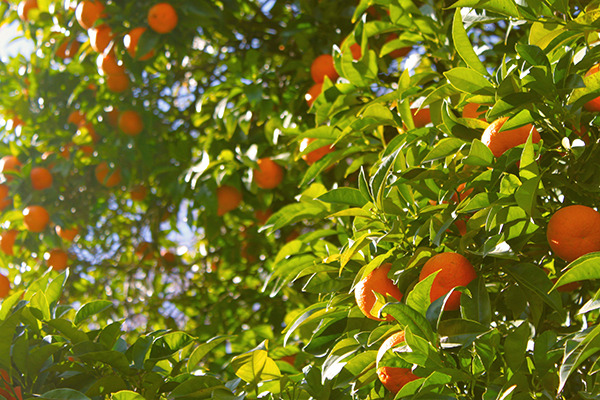News And Advice From The Leading Thousand Oaks Tree Trimming Company
From Orange County to the sprawling orange and lemon groves of the San Fernando Valley — sadly gone today — Southern California has been a mecca for anyone who loves to grow citrus and enjoy the fruits of their labor. Whether it’s fresh-squeezed orange juice or fresh lemon for your iced tea, ripe citrus is a delicious delight.

No wonder, then, that so many homeowners in the Conejo Valley have a variety of citrus trees growing in their yards. If you’d like to plant a few citrus trees, or improve the health of trees you already have, there are several things to keep in mind to keep your trees healthy and productive.
The Right Kind of Soil
Even within our valley, we have several different types of soil. Citrus trees prefer sandy or loamy soil, and need soil that drains properly. As you evaluate your yard, pay attention to how well it drains — dense soil that stays wet fosters root rot. If you’re looking to add compost to your soil, do not add heavy organic amendments, which can retain moisture.
Let The Sun Shine
Citrus trees love sunshine, which is why Southern California and Florida are known as citrus capitals. Find a spot in your yard where your citrus trees can get a minimum of six-eight hours of full, direct sun per day.
Planting Tips
While you can plant a new tree virtually any time of year, go ahead and try to plant in the spring in order to minimize shock and stress. When you dig a hole for planting, avoid digging too deep — go about as deep as the root ball itself. It should be planted slightly above the depth that the tree was in the container. That way you avoid water pooling around the trunk, which can lead to rot and disease.
Citrus Are Thirsty And Hungry
Citrus trees love water as much as they love sun. Water newly planted trees two-three times per week, then one-two times per week as they mature. Let the top few inches of soil dry out to avoid overwatering, but don’t let your trees dry out completely or the fruit will suffer. Also, citrus generally need more nitrogen and iron than other trees, so look for a citrus-specific, slow-release fertilizer and apply according to instructions.
Don’t Let Pests Bug You
Citrus trees are moderately susceptible to pests. Mites, aphids and even snails can damage your trees, and a variety of fungi can also be a problem. These are all problems that can be pretty easily avoided with off-the-shelf sprays. Look for products specific to your trees — lemon, orange, grapefruit etc. — and then follow instructions on the labels.
When it comes to pruning your trees, a professional’s touch is usually in order, so give us a call and we can give you an evaluation. Otherwise, take the time to care for your trees and you’ll be enjoying fresh fruit virtually year round — enjoy!

